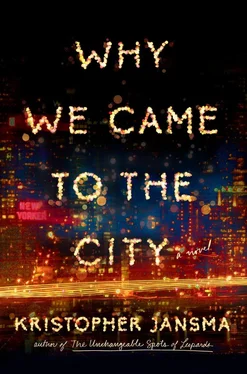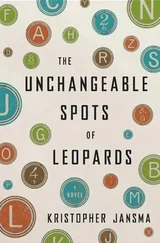Maura beamed up at the clouds rolling busily across the wide gray sky. And for a little while, until the November chill won out, they both believed there was a heaven out beyond them where a pantheon of gods and goddesses still did their occasional best to keep tabs on a world that had only gotten larger since everyone in it had stopped believing in them.
DECEMBER
It wasn’t clear who found out about Oliver and Sissy. Certainly Jacob hadn’t told anyone. But the rumor spread overnight, until everyone had heard the news. Allegedly the board was upset. Sissy was Oliver’s direct report, and one or the other of them would have to go. Word was that Sissy was taking this as her chance to leave and go out West, with icy streams in summer and horseflies and grand plateaus and blackbirds and whatnot.
Oliver called Jacob into his office that afternoon. He kept the door shut and spoke in whispers, as if he might somehow get in more trouble. “Jacob, I don’t know what you’ve heard, but obviously—”
Jacob stood back and raised his arms dramatically. “I’m shocked— shocked! — to find out that there is gambling going on in this establishment.”
“Is that supposed to be funny?”
“It’s pretty funny in Casablanca at least,” Jacob said. “Look, I don’t care if you want to try to be straight. I don’t think it’s going to work, but hey, I get it. After your father and everything.”
“Jacob, I don’t want to talk about that. I’m trying to — damn it, I’m trying to apologize to you here. I tried for months to make it clear that our relationship just wasn’t working.”
“Hell, Oliver, I knew that.”
“Then why didn’t you just end things with me and move on, if you knew?” Oliver looked as if he might cry.
Jacob felt terrible. What a way to treat his gloomy octopus. “I think I was sort of taking the year off. I didn’t want to make any decisions I’d regret.”
Oliver’s eyes were wet. “You thought you might regret leaving me?”
It sounded a lot sweeter than he’d meant it, but Jacob was willing to let him have it. “It was a dumb idea.”
Oliver looked out his window. “Sissy has agreed to leave. The board will give her a severance for keeping quiet. She’s going to move out to Montana and start a community art program there.”
Jacob whistled. “Well, if I’d known there were payoffs involved… you and I shouldn’t have been so discreet.”
But Oliver wasn’t laughing. “She has a daughter. Did you know that? She’ll be eleven next month. We get along, she and I. Her name’s Virginia. I thought maybe it wasn’t too late for me to be a father to her.”
Jacob snorted. “Trying to take a positive role in a young girl’s life? I don’t know, Oliver. That sounds unhealthy to me.”
But Oliver didn’t laugh. “You must think I’m a fool.”
“Look, go with her then. Round up cows with Sissy if that’s what you want to do. Nothing’s stopping you, Oliver. Really. Nothing.”
Oliver seemed unconvinced, so Jacob clapped his hands and struck a mock-triumphant pose: “‘Therefore, take me and bind me to the crosspiece half way up the mast; bind me as I stand upright, with a bond so fast that I cannot possibly break away, and lash the rope’s ends to the mast itself. If I beg and pray you to set me free, then bind me more tightly still.’”
Oliver seemed torn between laughing and rolling his eyes. Laughing won out in the end. “You seriously need some help, my love.”
Jacob shrugged. “I don’t want to know anyone who doesn’t.”
They shared one last embrace of the old kind.
JANUARY
The year had passed, and Jacob went to Manhattan and walked into a synagogue. He took a yarmulke from the wicker basket. He put it on his head as he had, as a boy, on countless torturous Friday evenings, which stretched a dotted line back to some of his earliest resentments. He took a prayer book from the woman, and in minutes he was in the back of a big blue chamber, singing along to the same songs his Hebrew school days had tattooed onto his brain stem. The Jews of the Upper West Side were assembled around him — Jacob had expected them all to be old. He was surprised how many people his own age were there, and how many children, some dozing and some stretching and some turned around in their seats to stare at him with their big dinner-plate eyes. And, too, there were old men and ladies who could hardly heave themselves up when the time came to rise.
Jacob only mouthed along at first, not sure he wanted to pray, not to this God who’d taken Irene, and who’d taken over for all those other gods. But if once there was a god of the sun and a goddess of harvest and a god of war and a goddess of wisdom, then maybe this Consolidated Entity was still all those many things. Within this One Him, capital-G God, all the lowercase ones still existed. There was still a grim god of the underworld in there, and a tempestuous god of thunder. A sprightly messenger god and a raucous god of wine. Maybe He was still squabbling amongst Himself, still getting drunk and cheating on Himself (with Himself) and messing a thing or two up. So maybe He didn’t always wind up rewarding the best or punishing the wickedest. So maybe sometimes He took the wrong ones and let the right ones stay long past their due. Jacob could forgive Him for that. After all, it was a humongous world, and there used to be twelve of Him. Even then it hadn’t ever gone smoothly.
The rabbi and the cantor stood up in the front of the room and led the congregation in songs written nearly as long ago as the epics of Homer. They stood in front of the lighted closet that held the ark. Jacob remembered how much he liked that — the centrality of this document, the most sacred thing in the building, adorned with gold and readable only read by those who’d mastered the long-forgotten languages. It was what tied them all together.
When they read the Mourner’s Kaddish and called on those who knew someone who was seriously ill, or who had lost someone in the previous week, a dozen or more people stood up all around the crowd and spoke the names of their departed or their departing. Then the rabbi called out the list of congregants’ names who had passed away in that week in years past, and as their loved ones heard the names, they stood for a moment and then sat down again. There were so many.
“Are there any names that anyone would like to add?”
Jacob stood up, and he wasn’t alone. Three people came up on his left and four to his right. He said Irene’s name out loud, and the others spoke their names, and the rabbi asked them all to sit down again. Jacob felt scared and warm all over. He was both emptier and more satisfied. More alone and less, as if he’d just said goodbye and hello in the same breath.
The service ended, and various board members began making announcements about food drives and outreach programs, and Jacob found himself thinking about an article Ella had recently posted to his Facebook wall. A scientist had a semiridiculous theory that as clay was being shaped on a wheel, it absorbed the sound waves of the people speaking around it, and these vibrations were then trapped within the earth and air and water. And this terrific madman thought he could figure out how to play this record back again, even through ancient ceramic vases and urns, and hear the conversations of people who had been dead and gone and forgotten for five thousand years . Perhaps, Jacob thought, the scientist would find a way. He wished there had been a potter making a vase in Irene’s hospital room, so the vibrations of his last words to her would have been caught in its wet clay, and that this scientist someday would queue up his machines and point them at the little vase. Years from now someone else would hear him whispering the words that had made Irene smile in that last minute.
Читать дальше












